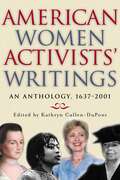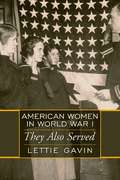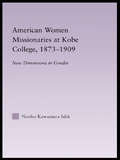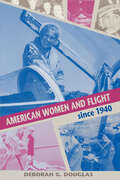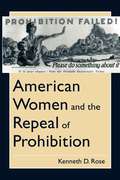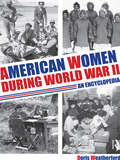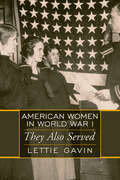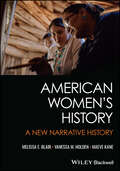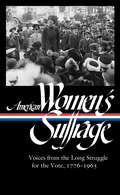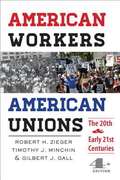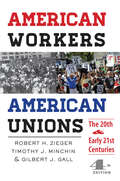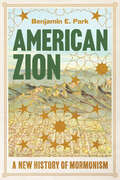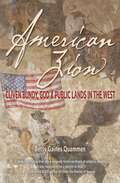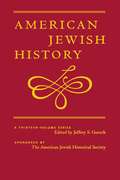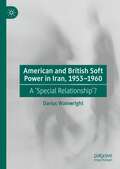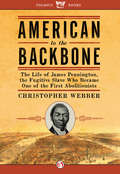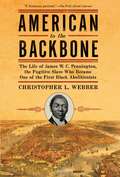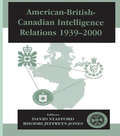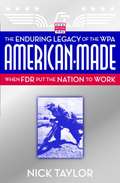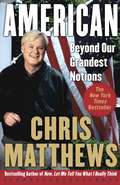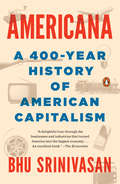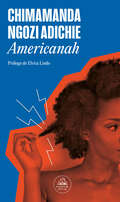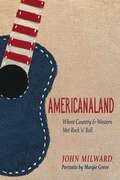- Table View
- List View
American Women Activists' Writings: An Anthology, 1637-2001
by Kathryn Cullen-DuPontAmerica's women activists have striven bravely and tirelessly to affect the course of American history. Their story, as told in letters, memoirs, diaries, and speeches, is as wide and varied as America itself. This anthology begins with the then-government's attempt to silence Anne Hutchinson, not permitted to address mixed audiences of men and women in the Massachusetts Bay colony, and leads to the formation of the women's rights movement. Highlights include Sojourner Truth describing her escape from slavery; Alice Walker's assessment of her work to end female genital mutilation; and Margarethe Cammermeyer's attempt to end the military's discharge of homosexuals.
American Women In World War I
by Lettie GavinInterweaving personal stories with historical photos and background, this lively account documents the history of the more than 40,000 women who served in relief and military duty during World War I. Through personal interviews and excerpts from diaries, letters, and memoirs, Lettie Gavin relates poignant stories of women's wartime experiences and provides a unique perspective on their progress in military service. American Women in World War I captures the spirit of these determined patriots and their times for every reader and will be of special interest to military, women's, and social historians.
American Women Missionaries at Kobe College, 1873-1909: New Dimensions In Gender (East Asia: History, Politics, Sociology and Culture)
by Noriko Kawamura IshiiThis study examines one aspect of American women's professionalization and the implications of the cross-cultural dialogue between American woman missionaries and Japanese students and supporters at Kobe College between 1873 and 1909.
American Women and Flight since 1940: since 1940
by Deborah G. Douglas“Individual women’s stories enliven almost every page” of this comprehensive illustrated reference, now updated, from the National Air and Space Museum (Technology and Culture).Women run wind tunnel experiments, direct air traffic, and fabricate airplanes. American women have been involved with flight from the beginning. But until 1940, most people believed women could not fly, that Amelia Earhart was an exception to the rule. World War II changed everything. “It is on the record that women can fly as well as men,” stated General Henry H. Arnold, commanding general of the Army Air Forces. Then the question became “Should women fly?” Deborah G. Douglas tells the story of this ongoing debate and its impact on American history. From Jackie Cochran, whose perseverance led to the formation of the Women’s Army Service Pilots (WASP) during World War II to the more recent achievements of Jeannie Flynn, the Air Force’s first woman fighter pilot and Eileen Collins, NASA’s first woman shuttle commander, Douglas introduces a host of determined women who overcame prejudice and became military fliers, airline pilots, and air and space engineers. Not forgotten are stories of flight attendants, air traffic controllers, and mechanics. American Women and Flight since 1940 is a revised and expanded edition of a Smithsonian National Air and Space Museum reference work. Long considered the single best reference work in the field, this new edition contains extensive new illustrations and a comprehensive bibliography.
American Women and the Repeal of Prohibition (The American Social Experience #17)
by Kenneth D RoseIn 1933 Americans did something they had never done before: they voted to repeal an amendment to the U.S. Constitution. The Eighteenth Amendment, which for 13 years had prohibited the manufacture and sale of alcoholic beverages, was nullified by the passage of another amendment, the Twenty-First. Many factors helped create this remarkable turn of events. One factor that was essential, Kenneth D. Rose here argues, was the presence of a large number of well-organized women promoting repeal. Even more remarkable than the appearance of these women on the political scene was the approach they took to the politics of repeal. Intriguingly, the arguments employed by repeal women and by prohibition women were often mirror images of each other, even though the women on the two sides of the issue pursued diametrically opposed political agendas. Rose contends that a distinguishing feature of the women's repeal movement was an argument for home protection, a social feminist ideology that women repealists shared with the prohibitionist women of the Women's Christian Temperance Union. The book surveys the women's movement to repeal national prohibition and places it within the contexts of women's temperance activity, women's political activity during the 1920s, and the campaign for repeal. While recent years have seen much-needed attention devoted to the recovery of women's history, conservative women have too often been overlooked, deliberately ignored, or written off as unworthy of scrutiny. With American Women and the Repeal of Prohibition, Kenneth Rose fleshes out a crucial chapter in the history of American women and culture.
American Women during World War II: An Encyclopedia
by Doris WeatherfordAmerican Women during World War II documents the lives and stories of women who contributed directly to the war effort via official and semi-official military organizations, as well as the millions of women who worked in civilian defense industries, ranging from aircraft maintenance to munitions manufacturing and much more. It also illuminates how the war changed the lives of women in more traditional home front roles. All women had to cope with rationing of basic household goods, and most women volunteered in war-related programs. Other entries discuss institutional change, as the war affected every aspect of life, including as schools, hospitals, and even religion. American Women during World War II provides a handy one-volume collection of information and images suitable for any public or professional library.
American Women in World War I: They Also Served
by Lettie GavinInterweaving personal stories with historical photos and background, this lively account documents the history of the more than 40,000 women who served in relief and military duty during World War I. Through personal interviews and excerpts from diaries, letters, and memoirs, Lettie Gavin relates poignant stories of women's wartime experiences and provides a unique perspective on their progress in military service. American Women in World War I captures the spirit of these determined patriots and their times for every reader and will be of special interest to military, women's, and social historians.
American Women's History: A New Narrative History (Women, Gender, And Sexuality In American History Ser. #1)
by Vanessa M. Holden Maeve Kane Melissa E. BlairOffers a nuanced account of the multiple aspects of women’s lives and their roles in American society American Women's History presents a comprehensive survey of women's experience in the U.S. and North America from pre-European contact to the present. Centering women of color and incorporating issues of sexuality and gender, this student-friendly textbook draws from cutting-edge scholarship to provide a more inclusive and complicated perspective on the conventional narrative of U.S. women’s history. Throughout the text, the authors highlight diverse voices such as Matoaka (Pocahontas), Hilletie van Olinda, Margaret Sanger, and Annelle Ponder. Arranged chronologically, American Women's History explores the major turning points in American women’s history while exploring various contexts surrounding race, work, politics, activism, and the construction of self. Concise chapters cover a uniquely wide range of topics, such as the roles of Indigenous women in North American cultures, the ways women participated in the American Revolution, the lives of women of color in the antebellum South and their experiences with slave resistance and rebellion, the radical transformation brought on by Black women during Reconstruction, the activism of women before and after suffrage was won, and more. Discusses how Indigenous women navigated cross-cultural contact and resisted assimilation efforts after the arrival of Europeans Considers the construction of Black female bodies and the implications of the slave trade in the Americas Addresses the cultural shifts, demographic changes, and women’s rights movements of the early twentieth century Highlights women’s participation in movements for civil rights, workplace justice, and equal educational opportunities Explores the feminist movement and its accomplishments, the rise of anti-feminism, and women’s influence on the modern political landscapeDesigned for both one- and two-semester U.S. history courses, American Women's History is an ideal resource for instructors looking for a streamlined textbook that will complement existing primary sources that work well in their classes. Due to its focus on women of color, it is particularly valuable for community colleges and other institutions with diverse student populations.
American Women's Suffrage: Voices from the Long Struggle for the Vote 1776-1965 (The Library of America)
In their own voices, the full story of the women and men who struggled to make American democracy wholeWith a record number of female candidates in the 2020 election and women's rights an increasingly urgent topic in the news, it's crucial that we understand the history that got us where we are now. For the first time, here is the full, definitive story of the movement for voting rights for American women, of every race, told through the voices of the women and men who lived it. Here are the most recognizable figures in the campaign for women's suffrage, like Elizabeth Cady Stanton and Susan B. Anthony, but also the black, Chinese, and American Indian women and men who were not only essential to the movement but expanded its directions and aims. Here, too, are the anti-suffragists who worried about where the country would head if the right to vote were universal. Expertly curated and introduced by scholar Susan Ware, each piece is prefaced by a headnote so that together these 100 selections by over 80 writers tell the full history of the movement--from Abigail Adams to the 1848 Declaration of Sentiments to the ratification of the Nineteenth Amendment in 1920 and the limiting of suffrage under Jim Crow. Importantly, it carries the story to 1965, and the passage of the Voting and Civil Rights Acts, which finally secured suffrage for all American women. Includes writings by Ida B. Wells, Mabel Lee, Margaret Fuller, Sojourner Truth, Frances Ellen Watkins Harper, Frederick Douglass, presidents Grover Cleveland on the anti-suffrage side and Woodrow Wilson urging passage of the Nineteenth Amendment as a wartime measure, Jane Addams, and Charlotte Perkins Gilman, among many others.
American Workers, American Unions
by Robert H. Zieger Timothy J. Minchin Gilbert J. GallHighly acclaimed and widely read since its first publication in 1986, American Workers, American Unions provides a concise and compelling history of American workers and their unions in the twentieth century and the first decade of the twenty-first. Taking into account recent important work on the 1970s and the Reagan revolution, the fourth edition newly considers the stagflation issue, the rise of globalization and big box retailing, the failure of Congress to pass legislation supporting the right of public employees to collective bargaining, the defeat in Congress of legislation to revise the National Labor Relations Act, the emasculation of the Humphrey-Hawkins Act, and the changing dynamics of blue-collar politics. In addition to important new information on the 1970s and 1980s, the fourth edition contains a completely new final chapter. Largely written by Timothy J. Minchin, this chapter provides a rare survey of American workers and their unions between 9/11 and the 2012 presidential election. Gilbert J. Gall presents new information on government workers and their recent battles to defend workplace rights.
American Workers, American Unions: The Twentieth and Early Twenty-First Centuries (The American Moment)
by Robert H. Zieger Timothy J. Minchin Gilbert J. GallAn update to the classic history of labor and unions for a post-9/11 world.Highly acclaimed and widely read since its first publication in 1986, American Workers, American Unions provides a concise and compelling history of American workers and their unions in the twentieth century and the first decade of the twenty-first. Taking into account recent important work on the 1970s and the Reagan revolution, the fourth edition newly considers the stagflation issue, the rise of globalization and big box retailing, the failure of Congress to pass legislation supporting the right of public employees to collective bargaining, the defeat in Congress of legislation to revise the National Labor Relations Act, the emasculation of the Humphrey-Hawkins Act, and the changing dynamics of blue-collar politics. In addition to important new information on the 1970s and 1980s, the fourth edition contains a completely new final chapter. Largely written by Timothy J. Minchin, this chapter provides a rare survey of American workers and their unions between 9/11 and the 2012 presidential election. Gilbert J. Gall presents new information on government workers and their recent battles to defend workplace rights.
American Workers, Colonial Power: Philippine Seattle and the Transpacific West, 1919-1941
by Dorothy B. Fujita-RonyDorothy B. Fujita-Rony traces the evolution of Seattle as a major site for Philippine immigration between World Wars I and II and examines the dynamics of the community through the frameworks of race, place, gender, and class.
American Zion: A New History of Mormonism
by Benjamin E. ParkNew Yorker — "The Best Books We’ve Read in 2024 So Far" The first major history of Mormonism in a decade, drawing on newly available sources to reveal a profoundly divided faith that has nevertheless shaped the nation. The Church of Jesus Christ of Latter-day Saints was founded by Joseph Smith in 1830 in the so-called “burned-over district” of upstate New York, which was producing seers and prophets daily. Most of the new creeds flamed out; Smith’s would endure, becoming the most significant homegrown religion in American history. How Mormonism succeeded is the story told by historian Benjamin E. Park in American Zion. Drawing on sources that have become available only in the last two decades, Park presents a fresh, sweeping account of the Latter-day Saints: from the flight to Utah Territory in 1847 to the public renunciation of polygamy in 1890; from the Mormon leadership’s forging of an alliance with the Republican Party in the wake of the New Deal to the “Mormon moment” of 2012, which saw the premiere of The Book of Mormon musical and the presidential candidacy of Mitt Romney; and beyond. In the twentieth century, Park shows, Mormons began to move ever closer to the center of American life, shaping culture, politics, and law along the way. But Park’s epic isn’t rooted in triumphalism. It turns out that the image of complete obedience to a single, earthly prophet—an image spread by Mormons and non-Mormons alike—is misleading. In fact, Mormonism has always been defined by internal conflict. Joseph Smith’s wife, Emma, inaugurated a legacy of feminist agitation over gender roles. Black believers petitioned for belonging even after a racial policy was instituted in the 1850s that barred them from priesthood ordination and temple ordinances (a restriction that remained in place until 1978). Indigenous and Hispanic saints—the latter represent a large portion of new converts today—have likewise labored to exist within a community that long called them “Lamanites,” a term that reflected White-centered theologies. Today, battles over sexuality and gender have riven the Church anew, as gay and trans saints have launched their own fight for acceptance. A definitive, character-driven work of history, American Zion is essential to any understanding of the Mormon past, present, and future. But its lessons extend beyond the faith: as Park puts it, the Mormon story is the American story.
American Zion: Cliven Bundy, God And Public Lands In The West
by Betsy Gaines Quammen"A deep, fascinating dive into a uniquely American brand of religious zealotry that poses a grave threat to our national parks, wilderness areas, wildlife sanctuaries, and other public lands. It also happens to be a delight to read." —JON KRAKAUER American Zion is the story of the Bundy family, famous for their armed conflicts in the West. With an antagonism that goes back to the very first Mormons who fled the Midwest for the Great Basin, they hold a sense of entitlement that confronts both law and democracy. Today their cowboy confrontations threaten public lands, wild species, and American heritage. BETSY GAINES QUAMMEN is a historian and conservationist. She received a doctorate in Environmental History from Montana State University in 2017, her dissertation focusing on Mormon settlement and public land conflicts. After college in Colorado, caretaking for a bed and breakfast in Mosier, Oregon, and serving breakfasts at a cafe in Kanab, Utah, Betsy has settled in Bozeman, Montana, where she now lives with her husband, writer David Quammen, three huge dogs, an overweight cat, and a pretty big python named Boots.
American Zionism: American Jewish History (American Jewish History)
by Jeffrey S. GurockFirst Published in 1998. Routledge is an imprint of Taylor & Francis, an informa company.
American and British Soft Power in Iran, 1953-1960: A 'Special Relationship'?
by Darius WainwrightThis book offers a distinctive approach to understanding Anglo-American relations with Iran in the early Cold War. It establishes how the United Kingdom and United States used soft power between 1953 and 1960 to combat communism and promote their respective ways of life in Iran. It identifies their motives, the types of initiatives employed, and the extent to which they perceived their policies to be a success. It is a historical case study through which wider conclusions regarding UK and US foreign policy can be drawn. As well as illustrating the competitive tensions within the Anglo-American 'special relationship', it highlights the role of individuals in the making and shaping of diplomatic endeavours. More broadly, the analysis of UK and US interactions in Iran through the prism of soft power underlines that there was more to both countries’ Cold War foreign policies than the containment of communism.
American to the Backbone
by Christopher L. WebberThe incredible story of a forgotten hero--a former slave, Yale scholar, minister, and international leader of the Antebellum abolitionist movement At the age of 19, scared and illiterate, James Pennington, escaped from slavery in 1827 and soon became one of the leading voices against slavery prior to the Civil War. Just ten years after his escape, Pennington was ordained as a priest after studying at Yale and was soon traveling all over the world as an anti-slavery advocate. He was so well respected by European audiences that the University of Heidelberg awarded him an honorary doctorate, making him the first person of African descent to receive such a degree. This treatment was a far cry from his home across the Atlantic, where people like him, although no longer slaves, were still second-class citizens.As he fought for equal rights in America, Pennington's voice was not limited to the preacher's pulpit. He wrote the first-ever "History of the Colored People" as well as a careful study of the moral basis for civil disobedience, which would be echoed decades later by Gandhi and Martin Luther King, Jr. More than a century before Rosa Parks took her monumental bus ride, Pennington challenged segregated seating in New York City street cars. He was beaten and arrested, but eventually vindicated when the New York State Supreme Court ordered the cars to be integrated. Although the struggle for equality was far from over, Pennington retained a delightful sense of humor, intellectual vivacity, and inspiring faith through it all. American to the Backbone brings to life this fascinating, forgotten pioneer, who helped lay the foundation for the contemporary civil rights revolution and inspire generations of future leaders.
American to the Backbone: The Life of James W. C. Pennington, the Fugitive Slave Who Became One of the First Black Abolitionists
by Christopher L. WebberThe incredible story of a forgotten hero of nineteenth century New York City--a former slave, Yale scholar, minister, and international leader of the Antebellum abolitionist movement. At the age of 19, scared and illiterate, James Pennington escaped from slavery in 1827 and soon became one of the leading voices against slavery prior to the Civil War. Just ten years after his escape, Pennington was ordained as a priest after studying at Yale and was soon traveling all over the world as an anti-slavery advocate. He was so well respected by European audiences that the University of Heidelberg awarded him an honorary doctorate, making him the first person of African descent to receive such a degree. This treatment was far cry from his home across the Atlantic, where people like him, although no longer slaves, were still second-class citizens. As he fought for equal rights in America, Pennington's voice was not limited to the preacher's pulpit. He wrote the first-ever "History of the Colored People" as well as a careful study of the moral basis for civil disobedience, which would be echoed decades later by Gandhi and Martin Luther King Jr. More than a century before Rosa Parks took her monumental bus ride, Pennington challenged segregated seating in New York City street cars. He was beaten and arrested, but eventually vindicated when the New York State Supreme Court ordered the cars to be integrated. Although the struggle for equality was far from over, Pennington retained a delightful sense of humor, intellectual vivacity, and inspiring faith through it all. American to the Backbone brings to life this fascinating, forgotten pioneer, who helped lay the foundation for the contemporary civil rights revolution and inspire generations of future leaders.
American-British-Canadian Intelligence Relations, 1939-2000 (Studies in Intelligence)
by David Stafford Rhodri Jeffreys-JonesThis work considers, for the first time, the intelligence relationship between three important North Atlantic powers in the Twenty-first century, from WWII to post-Cold War. As demonstrated in the case studies in this volume, World War II cemented loose and often informal inter-allied agreements on security intelligence that had preceded it, and created new and important areas of close and formal co-operation in such areas as codebreaking and foreign intelligence.
American-Made: When FDR Put the Nation to Work
by Nick TaylorIn response to massive poverty, rampant unemployment, breadlines, and "Hooverville" shantytowns during the Great Depression, the Roosevelt administration initiated the Works Progress Administration under the leadership of Harry Hopkins as a means of putting people back to work and as a lynchpin of its New Deal program. This is a history of the WPA that describes its origins, the political controversies over its activities, its contributions to the national infrastructure and eventually to the war effort, and the cultural legacy of its arts programs. Annotation ©2008 Book News, Inc., Portland, OR (booknews.com)
American: Beyond Our Grandest Notions
by Chris MatthewsFrom Chris Matthews, host of MSNBC's Hardball and NBC's The Chris Matthews Show, and New York Times bestselling author of Now, Let Me Tell You What I Really Think, comes a definitive work on the lifeblood of America -- its enduring spirit. People have often wondered what makes America truly great. With a citizenry of vastly different races, religions, cultures, and ethnic backgrounds, what intangible bond unites and defines us as "Americans"? In his own inimitable style, Chris Matthews offers a portrait of a country born of contradictions. We are a people reluctant to fight, who become ferocious when threatened or attacked. We are a deeply practical nation, yet we stand as the world's great optimists. Inherently suspicious of governmental power, we still embrace our flag in times of danger. Fiercely independent, in love with freedom, and eager to face the future, we are like no other people on earth. Matthews asserts that our greatest strength is a set of distinct notions that comprise our national character. The self-made man. The reluctant warrior. The lone hero. We celebrate them in our popular culture and throughout our history, from 1776 to 9/11. In American, Matthews explores the best America stands for and portrays our country as a beacon for the modern world -- unafraid of challenges, moving ever forward, and ready and willing to prevail.
Americana: A 400-Year History of American Capitalism
by Bhu SrinivasanFrom the days of the Mayflower and the Virginia Company, America has been a place for people to dream, invent, build, tinker, and bet the farm in pursuit of a better life. Americana takes us on a four-hundred-year journey of this spirit of innovation and ambition through a series of Next Big Things -- the inventions, techniques, and industries that drove American history forward: from the telegraph, the railroad, guns, radio, and banking to flight, suburbia, and sneakers, culminating with the Internet and mobile technology at the turn of the twenty-first century. The result is a thrilling alternative history of modern America that reframes events, trends, and people we thought we knew through the prism of the value that, for better or for worse, this nation holds dearest: capitalism. In a winning, accessible style, Bhu Srinivasan boldly takes on four centuries of American enterprise, revealing the unexpected connections that link them. We learn how Andrew Carnegie's early job as a telegraph messenger boy paved the way for his leadership of the steel empire that would make him one of the nation's richest men; how the gunmaker Remington reinvented itself in the postwar years to sell typewriters; how the inner workings of the Mafia mirrored the trend of consolidation and regulation in more traditional business; and how a 1950s infrastructure bill triggered a series of events that produced one of America's most enduring brands: KFC. Reliving the heady early days of Silicon Valley, we are reminded that the start-up is an idea as old as America itself.Entertaining, eye-opening, and sweeping in its reach, Americana is an exhilarating new work of narrative history.
Americanah
by Chimamanda Ngozi AdichieWINNER 2013 - National Book Critics Circle Award for Fiction FINALIST 2014 - Baileys Women's Prize for Fiction FINALIST 2014 - Andrew Carnegie Medal for Fiction LONGLISTED 2015 - International IMPAC Dublin Literary Award A searing new novel, at once sweeping and intimate, by the award-winning author of Half of a Yellow Sun: a story of love and race centered around a man and woman from Nigeria who seemed destined to be together--until the choices they are forced to make tear them apart. Ifemelu--beautiful, self-assured--left Nigeria 15 years ago, and now studies in Princeton as a Graduate Fellow. She seems to have fulfilled every immigrant's dream: Ivy League education; success as a writer of a wildly popular political blog; money for the things she needs. But what came before is more like a nightmare: wrenching departure from family; humiliating jobs under a false name. She feels for the first time the weight of something she didn't think about back home: race. Obinze--handsome and kind-hearted--was Ifemelu's teenage love; he'd hoped to join her in America, but post 9/11 America wouldn't let him in. Obinze's journey leads him to back alleys of illegal employment in London; to a fake marriage for the sake of a work card, and finally, to a set of handcuffs as he is exposed and deported. Years later, when they reunite in Nigeria, neither is the same person who left home. Obinze is the kind of successful "Big Man" he'd scorned in his youth, and Ifemelu has become an "Americanah"--a different version of her former self, one with a new accent and attitude. As they revisit their shared passion--for their homeland and for each other--they must face the largest challenges of their lives. Spanning three continents, entering the lives of a richly drawn cast of characters across numerous divides, Americanah is a riveting story of love and expectation set in today's globalized world.
Americanah
by Chimamanda Ngozi AdichieUna original historia sobre la inmigración en Estados Unidos desde el punto de vista de una estudiante de literatura nigeriana. Lagos, mediados de los noventa. En el marco de una dictadura militar y en una Nigeria que ofrece poco o ningún futuro, Ifemelu y Obinze, dos adolescentes atípicos, se enamoran apasionadamente. Como gran parte de su generación, saben que antes o después tendrán que dejar el país. Obinze siempre ha soñado con vivir en Estados Unidos, pero es Ifemelu quien consigue el visado para vivir con su tía en Brooklyn y estudiar en la universidad. Mientras Obinze lucha contra la burocracia para reunirse con Ifemelu, ella se encuentra en una América donde nada es como se imaginaba, comenzando por la importancia del color de su piel. Todas sus experiencias, desgracias y aventuras conducen a una única pregunta: ¿acabará convirtiéndose en una «americanah»? Americanah, que recoge el término burlón con que los nigerianos se refieren a los que vuelven de Estados Unidos dándose aires, es una historia de amor a lo largo de tres décadas y tres continentes, la historia de cómo se crea una identidad al margen de los dictados de la sociedad y sus prejuicios. Reseñas:«Confirma el virtuosismo, la empatía sin límites y la punzante agudeza social de Adichie.»Dave Eggers «Hay algunas novelas que cuentan una gran historia y otras que consiguen que cambies la manera que tienes de ver el mundo. Americanah, de Chimamanda Ngozi Adichie, consigue las dos cosas.»Elisabeth Day, The Guardian «Americanah es esa cosa rara en la ficción literaria contemporánea: una exuberante historia de amor que también es una crítica social penetrante y divertida [...]. Adichie escribe con perspicacia.»Vogue
Americanaland: Where Country & Western Met Rock 'n' Roll (Music in American Life #1)
by John MilwardA musical genre forever outside the lines With a claim on artists from Jimmie Rodgers to Jason Isbell, Americana can be hard to define, but you know it when you hear it. John Milward’s Americanaland is filled with the enduring performers and vivid stories that are at the heart of Americana. At base a hybrid of rock and country, Americana is also infused with folk, blues, R&B, bluegrass, and other types of roots music. Performers like Bob Dylan, Johnny Cash, Ray Charles, and Gram Parsons used these ingredients to create influential music that took well-established genres down exciting new roads. The name Americana was coined in the 1990s to describe similarly inclined artists like Emmylou Harris, Steve Earle, and Wilco. Today, Brandi Carlile and I’m With Her are among the musicians carrying the genre into the twenty-first century. Essential and engaging, Americanaland chronicles the evolution and resonance of this ever-changing amalgam of American music. Margie Greve’s hand-embroidered color portraits offer a portfolio of the pioneers and contemporary practitioners of Americana.
